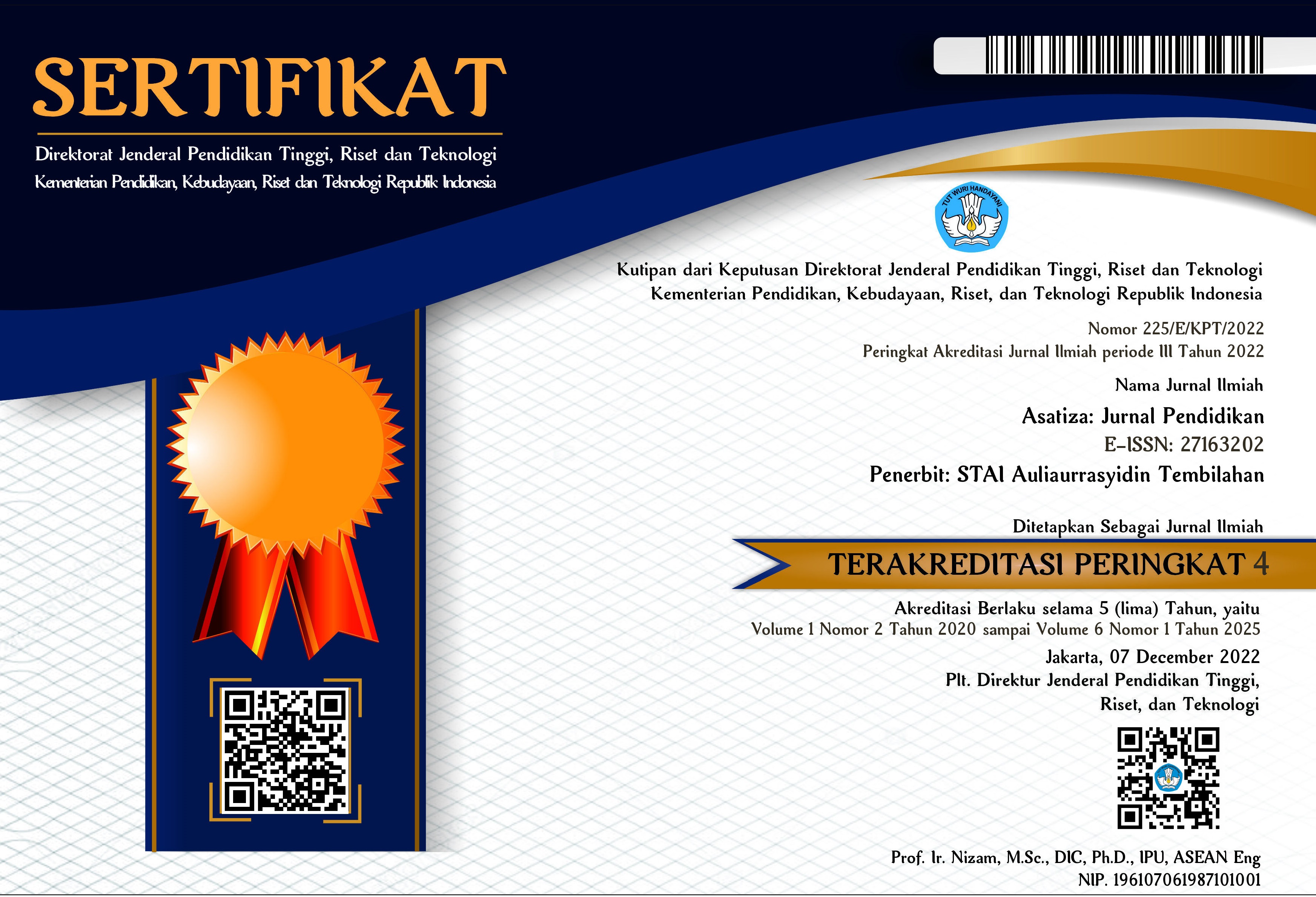Gaming for Growth: Investigasi Manfaat Akademik dan Kognitif dari E-Learning Berbasis Petualangan di Sekolah Menengah
DOI:
https://doi.org/10.46963/asatiza.v5i2.1794Keywords:
E-learning, Advanture Game, Academic AchievementAbstract
The use of technology in digital learning can enhance students' learning experience and open new opportunities to create innovative and engaging learning methods, especially at the high school level. This study aims to determine the impact of using adventure game-based e-learning on academic and cognitive of SMA N 3 Mandau students in Riau Province. The study used a mixed methods approach with a sample of 30 randomly selected grade X students. Quantitative data were collected through cognitive tests and questionnaires, while qualitative data were obtained through interviews and observations. The research procedure included pre-intervention, game implementation, monitoring, and data analysis. Quantitative data analysis using descriptive statistics and t-test, showed an increase in average learning outcomes from 59.6 to 78 with a correlation of 0.706, indicating a strong positive relationship between the use of the game and improved learning outcomes. Qualitative analysis using thematic analysis, showed a significant increase in academic and cognitive achievement of students who participated in the adventure game-based e-learning program.
Downloads
References
Abdul Bujang, S. D., Selamat, A., Krejcar, O., Maresova, P., & Nguyen, N. T. (2020). Digital learning demand for future education 4.0-case studies at Malaysia education institutions. Informatics, 7(2), 1–11. https://doi.org/10.3390/informatics7020013
Ahdan, S., Sucipto, A., & Agus Nurhuda, Y. (2019). Game untuk Menstimulasi Kecerdasan Majemuk pada Anak (Multiple Intelligence) Berbasis Android. Senter 2019, November, 554–568.
Ally, M. (2019). International Review of Research in Open and Distributed Learning Competency Profile of the Digital and Online Teacher in Future Education. International Review of Research in Open and Distributed Learning Competency, 20(2), 303–318. https://id.erudit.org/iderudit/1061343ar
Arfani, J. W., & Sugiyono, S. (2014). Manajemen Kelas Yang Efektif: Penelitian Di Tiga Sekolah Menengah Atas. Jurnal Akuntabilitas Manajemen Pendidikan, 2(1), 44–57. https://doi.org/10.21831/amp.v2i1.2408
Aziz, H. (2018). Education 4.0 Made Simple: Ideas For Teaching. International Journal of Education and Literacy Studies, 6(3), 92–98. https://journals.aiac.org.au/index.php/IJELS/article/view/4616
Calimag, J. a N. N. V, Miguel, P. A. G., Conde, R. S., & Aquino, L. B. (2014). Ubiquitous Learning Environment Using Android Mobile Application. International Journal of Research in Engineering & Technology.
Cioffi, R., Travaglioni, M., Piscitelli, G., Petrillo, A., & De Felice, F. (2020). Artificial intelligence and machine learning applications in smart production: Progress, trends, and directions. Sustainability (Switzerland), 12(2). https://doi.org/10.3390/su12020492
Coccoli, M., Guercio, A., Maresca, P., & Stanganelli, L. (2014). Smarter universities: A vision for the fast-changing digital era. Journal of Visual Languages and Computing, 25(6), 1003–1011. https://doi.org/10.1016/j.jvlc.2014.09.007
Dewi, R. M., Sholikhah, N., Ghofur, M. A., & Soejoto, A. (2020). Pelatihan Game Edukasi Android Berbasis HOTS Sebagai Media Evaluasi Pembelajaran. Abimanyu: Journal of Community Engagement, 1(1), 59–67. https://doi.org/10.26740/abi.v1i1.6791
El Mawas, N., Tal, I., Moldovan, A. N., Bogusevschi, D., Andrews, J., Muntean, G. M., & Muntean, C. H. (2020). Investigating the impact of an adventure-based 3D solar system game on primary school learning process. Knowledge Management and E-Learning, 12(2), 165–190. https://doi.org/10.34105/j.kmel.2020.12.009
Finn, C. E., & Fairchild, D. R. (2018). Education Reform for The Digital Era. Thomas B. Fordham Institute.
Ginting, S., & Irfansyah, I. (2022). Analisis Elemen Dramatis Game Petualangan Sebagai Media Penyadartahuan Terhadap Satwa. Ultimart: Jurnal Komunikasi Visual, 15(2), 160–172. https://doi.org/10.31937/ultimart.v15i2.2807
Gruszczynska, A., Merchant, G., & Pountney, R. (2013). “Digital Futures in Teacher Education”: Exploring Open Approaches towards Digital Literacy. Electronic Journal of E-Learning, 11(3), 193–206. https://academic-publishing.org/index.php/ejel/article/view/1669
Hasanah, U., Safitri, I., Rukiah, R., & Nasution, M. (2021). Menganalisis Perkembangan Media Pembelajaran Matematika Terhadap Hasil Belajar Berbasis Game. Indonesian Journal of Intellectual Publication, 1(3), 204–211. https://doi.org/10.51577/ijipublication.v1i3.125
Indahningrum, M. (2019). Game Adventure Untuk Pembelajaran Penggunaan Hatsuon Pada Mata Kuliah Hanashikata. Paramasastra, 7(2), 104. https://doi.org/10.26740/paramasastra.v7n2.p104
Jannah, R., & Haryadi, R. (2020). Pembelajaran Daring Fisika Siswa Sekolah Menengah Atas (SMA). Edumaspul: Jurnal Pendidikan, 4(2), 355–363. https://doi.org/10.33487/edumaspul.v4i2.842
Kurniawan, S., Sarah, Y. S., Medis, R., Kesehatan, I., & Kuningan, S. M. (2023). Meningkatkan Literasi Digital di Sekolah Menengah Atas: Tantangan, Strategi dan Dampaknya pada Keterampilan Siswa. INSOLOGI: Jurnal Sains Dan Teknologi, 2(4), 712–718. https://doi.org/10.55123/insologi.v2i4.2321
Lin, C. H., & Shih, J. L. (2018). Analysing group dynamics of a digital game-based adventure education course. Educational Technology and Society, 21(4), 51–63.
Marto, H. (2021). Evaluation of The Effect of Use Smartphone on Student Learning Motivation Covid-19 Pandemic Time. Aksara; Jurnal Ilmnu Pendidikan Nonformal, 07(September), 1359–1364.
Ningsih, D. U., Sulistiyowati, T. I., & Santoso, A. M. (2023). Studi Kasus Pembuatan Game Edukasi Sains Belajar.MU Berbasis Metaverse Menggunakan Aplikasi Roblox Studio. Seminar Nasional Pendidikan Dan Pembelajaran Ke-6, 602–610.
Noemí, P.-M., & Máximo, S. H. (2014). Educational Games for Learning. Universal Journal of Educational Research, 2(3), 230–238. https://doi.org/10.13189/ujer.2014.020305
Novitasari, U. N., Safitri, D., & Saptiwi, N. A. (2020). Strategi Pengembangan Kemampuan Berpikir Logis Dengan Menggunakan Game Petualangan Digital di Era New Normal. Prosiding Seminar Nasional Penalaran Dan Penelitian Nusantara, 1, 67–75.
Ouariachi, T., Olvera-Lobo, M. D., Gutiérrez-Pérez, J., & Maibach, E. (2019). A framework for climate change engagement through video games. Environmental Education Research, 25(5), 701–716. https://doi.org/10.1080/13504622.2018.1545156
Plass, J. L., Homer, B. D., Macnamara, A., Ober, T., Rose, M. C., Pawar, S., Hovey, C. M., & Olsen, A. (2019). Emotional Design for Digital Games for Learning: The Affective Quality of Expression, Color, Shape, and Dimensionality of Game Characters. study 4, 1–55.
Prameswari, N. S., Suharto, M., Sumarni, S., & Maryono, D. (2019). Educational Content Analysis of The Most Popular Game in Android Application Based on Play Store Version. 271(Iconarc 2018), 145–148. https://doi.org/10.2991/iconarc-18.2019.90
Pratama, L. D., Lestari, W., & Bahauddin, A. (2019). Game Edukasi: Apakah membuat belajar lebih menarik? At- Ta’lim : Jurnal Pendidikan, 5(1), 39–50. https://doi.org/10.36835/attalim.v5i1.64
Puspitarini, Y. D., & Hanif, M. (2019). Using Learning Media to Increase Learning Motivation in Elementary School. Anatolian Journal of Education, 4(2), 53–60. https://doi.org/10.29333/aje.2019.426a
Rahmatullah, A. S., Mulyasa, E., Syahrani, S., Pongpalilu, F., & Putri, R. E. (2022). Digital era 4.0: The Contribution to Education and Student Psychology. Linguistics and Culture Review, 6, 89–107. https://doi.org/10.21744/lingcure.v6ns3.2064
Ramli, I. S. M., Maat, S. M., & Khalid, F. (2022). The design of game-based learning and learning analytics. Cypriot Journal of Educational Sciences, 17(5), 1742–1759. https://doi.org/10.18844/cjes.v17i5.7326
Ratheeswari, K. (2023). Information Communication Technology in Education: Bringing Innovation in Classroom. Journal of Applied and Advanced Research, 8(1), 96–110. https://doi.org/10.3126/gd.v8i1.57335
Saifuddin, M. F. (2018). E-Learning dalam Persepsi Mahasiswa. Jurnal VARIDIKA, 29(2), 102–109. https://doi.org/10.23917/varidika.v29i2.5637
Sari, R. N. K., & Ahmad, H. A. (2022). Game-based Learning: Media Edutainment Matematika. Prosiding Seminar Nasional Manajemen, Desain & Aplikasi Bisnis Teknologi (SENADA), 5, 99–106.
Shih, J. L., & Hsu, Y. J. (2016). Advancing adventure education using digital motion-sensing games. Educational Technology and Society, 19(4), 178–189.
Sudarmilah, E., Pradana, I. C. A., & Priyawati, D. (2022). Android Game-Based Learning Media Recognizes the Structure and Functions of Plant and Animal Parts for Elementary School. JUITA: Jurnal Informatika, 10(1), 107. https://doi.org/10.30595/juita.v10i1.12582
Sugiyono, P. (2017). Metode Penelitian & Pengembangan “Research and Development” Untuk Bidang Pendidikan, Manajemen, Sosial, Teknik. Alfabeta.
Tayibnapis, R. G. (2021). Fenomena Game Online Dan Pembaruan Teknologi Komunikasi Sebagai Media Baru. Jurnal Curere, 6(11), 32–50.
Teräs, M. (2022). Education and technology: Key issues and debates. International Review of Education, 68(4), 635–636. https://doi.org/10.1007/s11159-022-09971-9
Vara, C. F. (2009). Integrating Story Into Simulation Through Performance (Issue December). http://smartech.gatech.edu/handle/1853/31756
Walelang, A. V., Liliana, L., & Budhi, G. S. (2015). Game Pembelajaran Fisika Dengan Game Bertipe Adventure Game. Jurnal Infra, 3(2), 346–352. http://publication.petra.ac.id/index.php/teknik-informatika/article/view/3159
Wati, W., & Istiqomah, H. (2019). Game Edukasi Fisika Berbasis Smartphone Android Sebagai Media Pembeajaran Fisika. Indonesian Journal of Science and Mathematics Education, 2(2), 162–167. https://doi.org/10.24042/ijsme.v2i2.4341
Winarsih, M., & Pianora Sarris, A. (2018). Educative Video Game Based Android System for Learning Early Reading for Children with Hearing Impairment. American Journal of Educational Research, 6(8), 1111–1116. https://doi.org/10.12691/education-6-8-8
Winaryati, E. (2018). Penilaian Kompetensi Siswa Abad 21. Seminar Nasional Edusainstek FMIPA UNISMUS 2018, 6(1), 6–19. https://jurnal.unimus.ac.id/index.php/psn12012010/article/viewFile/4070/3782
Zakirman,Z, Widiasih, W., Aprianti, R., & Nadiyyah, K. (2023). The Need for Electronic-Games to Support Student Involvement and Concentration in Learning. Jurnal Pijar Mipa, 18(4), 592–600. https://doi.org/10.29303/jpm.v18i4.5213
Downloads
Published
Issue
Section
License
Copyright (c) 2024 Zakirman Zakirman, Chichi Rahayu, Widiasih Widiasih

This work is licensed under a Creative Commons Attribution-ShareAlike 4.0 International License.
Authors who publish with this journal agree to the following terms:
1. Copyright on any article is retained by the author(s).
2. The author grants the journal, right of first publication with the work simultaneously licensed under a Creative Commons Attribution shareAlike 4.0 International License that allows others to share the work with an acknowledgment of the work’s authorship and initial publication in this journal.
3. Authors are able to enter into separate, additional contractual arrangements for the non-exclusive distribution of the journal’s published version of the work (e.g., post it to an institutional repository or publish it in a book), with an acknowledgment of its initial publication in this journal.
4. Authors are permitted and encouraged to post their work online (e.g., in institutional repositories or on their website) prior to and during the submission process, as it can lead to productive exchanges, as well as earlier and greater citation of published work.
5. The article and any associated published material is distributed under the Creative Commons Attribution-ShareAlike 4.0 International License











2.png)



